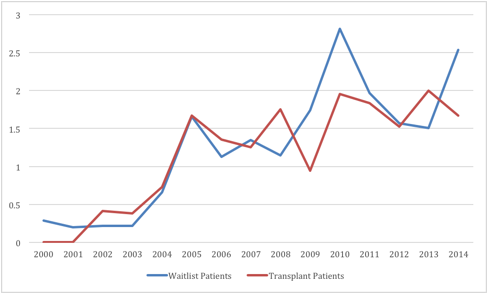Session Information
Date: Tuesday, November 7, 2017
Title: Systemic Sclerosis, Fibrosing Syndromes and Raynaud's – Clinical Aspects and Therapeutics Poster III
Session Type: ACR Poster Session C
Session Time: 9:00AM-11:00AM
Background/Purpose:
Systemic sclerosis (SSc) is a chronic autoimmune disease once characterized by high mortality rates now with better outcomes. Pulmonary disease has overtaken renal failure as the leading cause of death. Unfortunately medical therapies are still lacking in this regard and lung transplantation ultimately becomes the most viable option. For many years these patients were not offered lung transplants due to the perception that they would do poorly. In 2006 the International Society of Heart and Lung Transplantation (ISHLT) endorsed Lung transplant (LT) as an option for SSc although many programs still considered SSc a contraindication due to concerns of poor allograft function and presumed low patient survival due to the extra pulmonary organ involvement. Since then retrospective cohort studies [1] have shown survival data post transplant very similar to other similar processes i.e IPF and IPAH which have well-established indications for lung transplant and acceptable outcomes. The question remains if this new literature is resulting in more patients with systemic sclerosis being waitlisted for or actually undergoing transplant since for those that are not mortality is high.
Methods:
We looked retrospectively at all patients with a scleroderma, scleroderma – restrictive, and scleroderma – pulmonary hypertension diagnosis within The United Network Organ Sharing Database from the years 2000 to 2014. This database captures the lung transplants in the United States including those that are waitlisted. The diagnoses above will be used to trend the rates of patients with SSc being waitlisted and undergoing transplants from 2000-2014.
Results:
The data shows that since the year 2000 the percent of patients on the UNOS waitlist and those actually undergoing lung transplantation with a diagnosis of systemic sclerosis has risen. Percent of patients in 2000 with SSc on the waitlist was .29 percent which increased to 2.54 percent in 2014. Percent of patients with SSc who received lung transplant was zero in 2000 increasing to 1.67 in 2014.
Conclusion:
Since the ISHLT endorsed LT as an option for SSc the number of patients with this diagnosis make up a higher proportion of those being waitlisted and undergoing transplant. As data continues to show that these patients do better than what was once believed, efforts should focus on assessing clinical phenotypes and investigating how this may influence not only waitlisting itself, but time to transplant and other outcomes such as mortality.
Eberlein, M., & Mathai, S. (2016). Lung Transplantation in Scleroderma. Time for the Pendulum to Swing?. Annals Of The American Thoracic Society, 13(6), 767-769.
To cite this abstract in AMA style:
Bhatty O, Sen R, Moore D, Nahas J. Lung Transplant Trends in Patients’ with Systemic Sclerosis Using UNOS (United Network Organ Sharing) Database from 2000-2014 [abstract]. Arthritis Rheumatol. 2017; 69 (suppl 10). https://acrabstracts.org/abstract/lung-transplant-trends-in-patients-with-systemic-sclerosis-using-unos-united-network-organ-sharing-database-from-2000-2014/. Accessed .« Back to 2017 ACR/ARHP Annual Meeting
ACR Meeting Abstracts - https://acrabstracts.org/abstract/lung-transplant-trends-in-patients-with-systemic-sclerosis-using-unos-united-network-organ-sharing-database-from-2000-2014/


